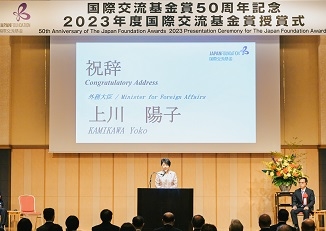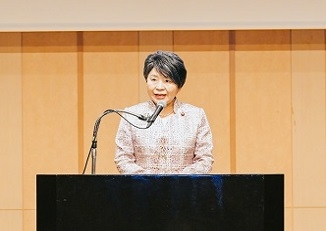The 50th Japan Foundation Awards
―Culture Transcending Borders― <1>
Report for 2023 Presentation Ceremony for the Japan Foundation Awards
May 24, 2024
【Special Feature 080】
Special Feature: The 50th Japan Foundation Awards ―Culture Transcending Borders―(for summary on special features, click here)
The Japan Foundation Awards, held for the 50th time in 2023, began in 1973, one year following the establishment of the Japan Foundation. Every year, the awards are presented to individuals and organizations that have made significant contributions to promoting international mutual understanding and friendship between Japan and other countries through academic, artistic and other cultural pursuits. Past recipients include such luminaries as Bernard H. Leach (potter, 1974), Kurosawa Akira (film director, 1982), Donald Keene (Professor of Japanese literature, Columbia University, 1983), Ozawa Seiji (music director, Boston Symphony Orchestra, 1988), Miyazaki Hayao (animated film director, 2005), Murakami Haruki (writer and translator, 2012) and Cai Guo-Qiang (artist, 2016). (Listed positions were held when awarded).
This year's Award recipients to commemorate the 50th anniversary of the Awards included two individuals and one organization: Miyagi Satoshi (Stage Director/General Artistic Director of the Shizuoka Performing Arts Center), Ogawa Yoko (Novelist) from Japan, and Peruvian Japanese Association/Asociación Peruano Japonesa (APJ) from Peru. This is a report of the presentation ceremony held in Tokyo attended by the recipients on October 18, 2023.
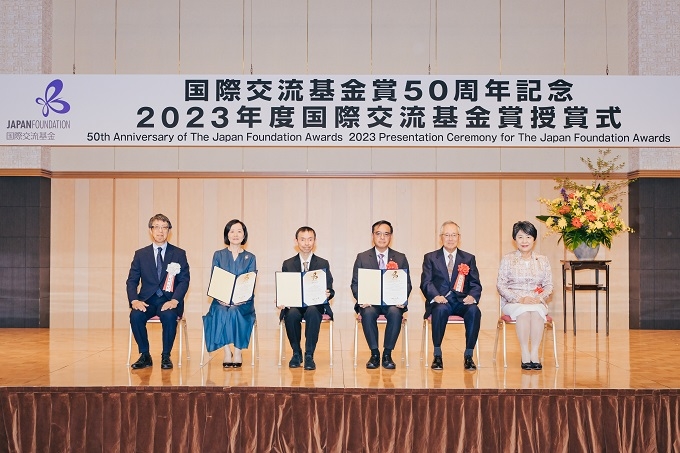
The Japan Foundation Awards is one of the oldest programs at the Japan Foundation, with 204 recipient individuals and organizations from 34 countries across the globe as of the 2022 awards.
For this year as well, recommendations were made by intellectuals in various fields from around the world as well as solicited publicly based on the three themes of Arts and Cultural Exchange, Japanese-Language Education Overseas, and Japanese Studies and Global Partnerships that make up the core of the Japan Foundation's activities. From among the 78 recommendations, recipients were then selected through discussions by the selection committee made up of 21 intellectuals.
At the Award Ceremony held on October 18 in Tokyo, in addition to Award recipients, organization representatives and others, Ms. Kamikawa Yoko, Minister of Foreign Affairs, was invited in celebration of the 50th anniversary of the Japan Foundation Awards, for a total attendance of approximately 200 people including the selection committee.
After the Award Ceremony, the Japan Foundation Awards 50th Anniversary Reception was held, in the presence of Their Imperial Highnesses Crown Prince and Crown Princess Akishino, who held relaxed conversation with the Award recipients.
The Foreign Minister Kamikawa Yoko offered a congratulatory address at the Award Ceremony.
In addition to offering a congratulatory address to the 2023 Japan Foundation Award recipients, Foreign Minister Kamikawa expressed her respect and gratitude for the contributions made by everyone who continued their activities with passion despite the COVID-19 crisis.
The Minister highlighted the milestones of the Japan Foundation's 50th anniversary in 2022 and the Japan Foundation Award's 50th anniversary in 2023, and the high expectations she has for continuous contributions of the Japan Foundation to support the efforts and initiatives of the Award recipients towards mutual understanding and exchange.
The Minister furthermore mentioned the high interest in Japanese culture she encountered while meeting individuals from around the world, and expressed the importance of exploring literary culture when seeking a better understanding of other countries. Minister Kamikawa also shared the intention of the Ministry of Foreign Affairs to continue joining hands with the Japan Foundation to steadily share the appeal of Japanese literary arts and language with countries around the world and pursue dynamic diplomacy.
After Minister of Foreign Affairs Kamikawa's address, the Award recipients were introduced alongside with their contributions, before being awarded by the organizer.
Mr. Miyagi Satoshi has earned praise around the world for his unique approach that combines the body, words and music into a cohesive theater play. He has given numerous performances abroad, starting with the Greek tragedy Antigone performed at the Avignon Festival in France and Mahabharata - Nalacharitam - performed at the occasion of Japonisme 2018 in Paris. The Shizuoka Performing Arts Center (SPAC), at which Mr. Miyagi lead in as General Artistic Director, invites theatrical productions from around the world, making a major contribution to international mutual understanding through the performing arts.
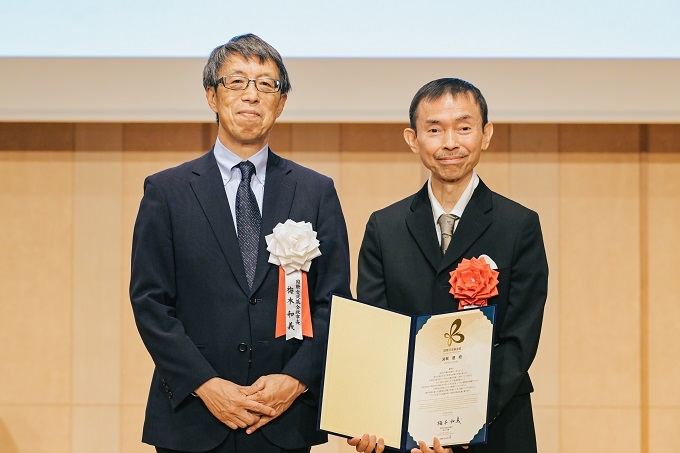 Mr. Umemoto Kazuyoshi, President of the Japan Foundation (left), and Mr. Miyagi Satoshi(right)
Mr. Umemoto Kazuyoshi, President of the Japan Foundation (left), and Mr. Miyagi Satoshi(right)
Ms. Ogawa Yoko is a novelist with an expansive bibliography of long and short works including The Housekeeper and the Professor and The Memory Police. Her novels, written in elegant Japanese, have been translated into a total of 37 languages across 36 works, crossing the barriers of language and borders to earn praise from readers around the world. In recent years, Ms. Ogawa has been nominated for a series of international literary awards, serving as a role model that encourages not only Japanese authors, but also those involved in Japanese language education, making a tremendous contribution to international mutual understanding through literature and the Japanese language.
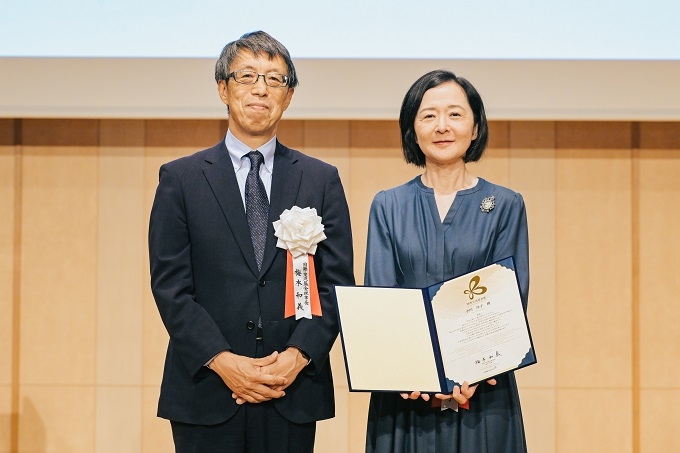 Ms. Ogawa Yoko (right)
Ms. Ogawa Yoko (right)
Since its founding in 1917, the Peruvian Japanese Association in Peru has supported the communication of over 100,000 Japanese immigrants and their descendants in Peru and promoted the understanding of Japanese culture. After the World War II, the Association has promoted Japanese language education centered around the Peruvian-Japanese Cultural Center and today serves as a hub for Japanese language education in South America. The Association is also a central figure in the research of Japan and international dialogue, pursuing projects such as the translation and publication of classical Japanese works. In light of its numerous contributions across a wide range of fields, it is particularly timely that the Peruvian Japanese Association is bestowed a Japan Foundation Award for 2023, the year of the 150th anniversary of the establishment of diplomatic relations between Japan and Peru.
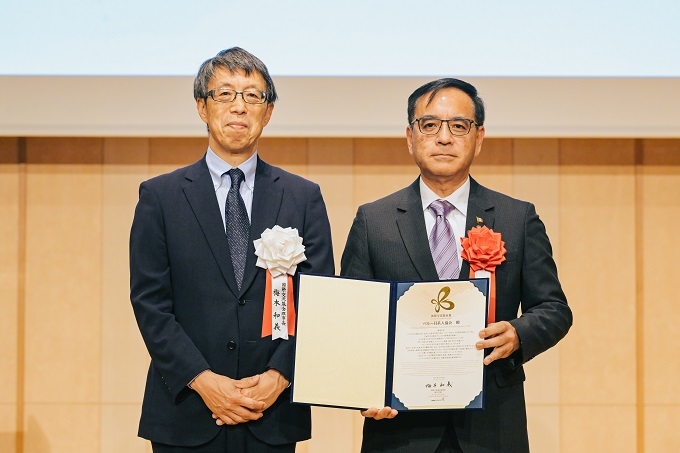 Mr. Juan Carlos Nakasone Oshiro, President of Peruvian Japanese Association (right)
Mr. Juan Carlos Nakasone Oshiro, President of Peruvian Japanese Association (right)
After receiving the Awards, the recipients gave speeches.
Mr. Miyagi gave the following speech:
Thank you for inviting me here today. I have attended similar ceremonies in the past as guest, when my respected associates in the theater world, who came before me, received wonderful awards like this. And on each occasion, those award-winning artists all had the same thing to say.
They all said, "I feel that I've been given a push on the back to try even harder."
Before, I would always wonder why they said that, and I even imagined that the phrase being listed under "Award Speeches" in a manual. It was not until recently that I began to realize what was behind that phrase. It was, in a word, loneliness.
Clearly, you must have enjoyed a relatively long career to receive such an award. And throughout that career, you are entirely focused on the day to day, like a hamster on a wheel, rushing towards the next opening night. But if you stop and look around you, you find that the friends you once saw as competitive rivals have disappeared one by one, and it has become difficult to rely on that competition to motivate yourself.
So, in this art form of theater, which disappears as soon as it is performed, what can we use to instill ourselves with the desire to continue forward? In fact, I have finally come to realize that the latter half of a theater artist's life is spent grappling with this question. The words, "I feel that I've been given a push on the back to try even harder" carry quite a bit of weight, don't they? I am extremely grateful to have received the Japan Foundation Award this year.
Let me mention one more thing I am grateful for. Though theater director Robert Lepage received the award last year, this is the first time that a Japanese stage director has received the Japan Foundation Award. For myself, I feel honored that the unglamorous profession of director has been recognized as having some bearing on reducing international tensions and promoting peace.
Human beings have long repeated huge follies. Even if many people are filled with bitter resolve to never repeat the same mistake immediately after the tragedy, once those people are gone, human beings once again choose the path of catastrophe, out of the belief that it is the only solution to the troubles. I believe this has been the course of human history.
Such choices of catastrophe are always backed by a mental state of being forced into a corner, and those feelings of fear are often accompanied inextricably by feelings of fervor.
While theater cannot offer solutions to those troubles, it can demonstrate the challenges faced by people centuries ago, the suffering they had to endure, and the words they spoke through the expressions of the actors of our time.
By observing the characters on the stage in a chaotic state, the audience can project itself in a similarities situation, and can regain a kind of calmness or composure that is the opposite of fervor. I believe that this is the virtue of theater.
While directing is still a profession with only a short history, it suddenly began to attract more attention in the second half of the 20th century. People shared a feeling of crisis, recognizing that if another world war started, humanity would be over. I think this brought the spotlight on the role of theater director. In other words, directors have the mission of presenting classical drama to his or her contemporary audience, as traces of the suffering of humanity in the past.
Theater directors now offer the gleam of hope to the audience reminding that the human being has been surmounting the similar crisis in the past, and it is possible to avoid the worst by acting with reason.
However, sadly, this profession of directors is no longer in the spotlight, and is beginning to be forgotten, probably since the fear of another world war that would end humanity is diminishing. This is why it is time for directors to take the responsibility for that gleam of hope so that humanity will not lead to another catastrophe.
And therefore, I consider this award as an encouragement, suggesting that the contribution as theater director is even more needed today. I would like to reassure younger directors by saying "Yes, your profession is necessary." Thank you.
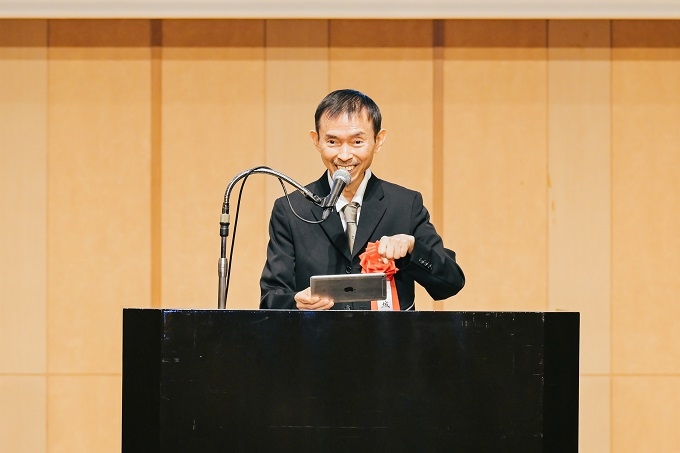 Mr. Miyagi Satoshi speaking of the importance of the director's profession today
Mr. Miyagi Satoshi speaking of the importance of the director's profession today
Next, Ms. Ogawa gave her acceptance speech.
Good evening, everyone. I am author Ogawa Yoko. I am greatly humbled to receive the immensely prestigious Japan Foundation Award this year. I would like to take this opportunity to express my deepest gratitude to the selection committee members who considered my work and the many other individuals who worked so hard to make these awards possible.
It was 1995 when a novel of mine, The Diving Pool, was published overseas for the first time in France by Actes Sud under the title La Piscine. I would like to say thank you to the members of the Japan Copyright Export Center who have presented my novels to the world from then until now. I would not be standing here today if not for the passion of those individuals to carry Japanese literature overseas. The first president, Ms. Kurita Akiko, and the current president, Ms. Yoshida Yurika, have always had what is best for my works in mind, and have worked behind the scenes to support them. I cannot thank them enough.
Also, to my first translator, Ms. Rose-Marie Makino-Fayolle, the first book you read when you had been sent a box full of Japanese novels by Ms. Kurita was mine, because it had the simplest binding. The only explanation for how we came to meet is that the god of literature brought us together.
I would also like to thank Professor Stephen Snyder, who has come all the way from the U.S. to join us today. It was a greater challenge than I imagined to make Japanese books available to readers in the English speaking world, but thanks to Professor Snyder's translations, the road was opened at once. I believe that translation is a daunting task that involves unraveling a work completely before weaving it back together again. When Professor Snyder reweaves his translations, he discovers little stars that further illuminate the work that even the author was unaware of. I have nothing but gratitude for him.
Since my debut in 1988, I have depicted countless different characters who bear their weaknesses and the weight of their fate, yet somehow survive no matter how malicious their secret thoughts or how marginalized they are by society, and I have come to believe that it is the writer's role to leave behind in words the traces of those lives that would disappear if left unspoken. One cannot write a novel without first acknowledging that person, rather than dismissing them according to a narrow set of values.
And as I encounter readers from overseas, I experience a visceral sense that this tolerance resonates far beyond national borders. To date, I have not once detected something off due to a difference of nationality among the readers of my novels.
One day, on vacation in Paris, I entered a small bookstore and thought I'd try asking if they had any books by Yoko Ogawa. Without a moment's hesitation, the elderly proprietor pointed to a spot on the bookshelf. Sure enough, there were my books. The novels I had written had traveled to a faraway place in a language that I could not read. It was a moment of unequaled joy for me as a writer.
Today, we are joined by the editors who guided me through my inexperience over many years. It is their assistance that has allowed me to continue writing until today despite my despair over my lack of ability. I would like to offer my deepest gratitude once again.
Thank you all again.
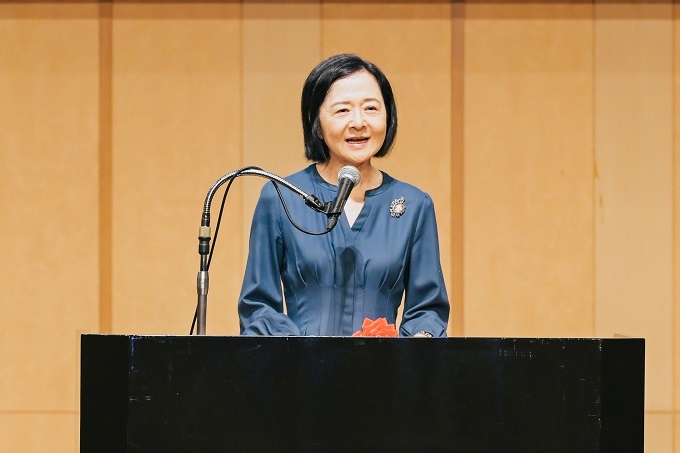 Ms. Ogawa expressing her gratitude for her translators and partners who assisted in the publication of her works overseas
Ms. Ogawa expressing her gratitude for her translators and partners who assisted in the publication of her works overseas
Mr. Juan Carlos Nakasone Oshiro, President of the Peruvian Japanese Association, then gave the following speech.
Good evening,
On behalf of the Japanese Peruvian Association, I am very pleased to greet the Japan Foundation and express our deep and sincere gratitude for having awarded us with this important prize, "The Japan Foundation Awards 2023." Also, We would like to congratulate the general artistic director of the Shizuoka Performing Arts Center in Japan, Mr. Miyagi Satoshi; and the novelist Ms. Ogawa Yoko with who we share this distinction tonight.
I would also like to express our special recognition to the Japan Foundation for their important work disseminating Japanese culture in the world for more than 50 years and for the recent opening of their office in Lima, Peru, which will allow us to work more closely together and strengthen the ties of cooperation between our institutions.
It was a pleasant surprise to find out that our institution was chosen among 78 proposed candidates to this special price. We have shared this immense happiness with our directors and collaborators, some of whom join us today in this ceremony. Without them, it would have not been possible to grow as an institution and work in benefit of our community.
This award is also very significant, because this 2023 we are commemorating the 150 years of the establishment of diplomatic relations between Peru and Japan, which occurred in 1873 with the signing of the Preliminary Treaty of Peace, Friendship, Commerce and Navigation. This treaty later gave rise to the Japanese immigration to Peru. It has been 124 years since the Sakura Maru ship set sail from the Port of Yokohama to reach the Peruvian coast.
The legacy of the immigrant pioneers has been preserved from generation to generation. In 1917, the immigrants founded the Central Japanese Society (Chuo Nihonjinkai), today the Japanese Peruvian Association, which brought together and represents all the Japanese Immigrants and their descendants in Peru.
Our institution actively organizes different cultural activities, we spread Japanese culture promoting the practice of japanese martial arts, board games as Igo and Shogi; we have a Japanese Language Center in Lima and our influences expands throughout the region with the Meeting of Spanish-Speaking Countries for the Teaching of the Japanese Language in South America. In addition, we contribute to education through various courses ranging from Japanese Gastronomy to Ikebana. We have an editorial fund, where we print traditional Japanese and Nikkei literature and we preserve the history of the Japanese immigration to Peru in the "Carlos Chiyoteru Hiraoka" Museum.
As part of our social outreach program, we ensure the well-being and development of community members, especially senior adults - through recreation and support programs - and young people, granting them educational credits. We bring health to the community through the Japanese Peruvian Polyclinic established in 1981 and the Japanese Peruvian Centenary Clinic, established in 2005.
Over the years we can see that the cooperation between both countries is constant, and the support received in Peru from Japanese institutions is consolidated day by day. This the ceremony that summons us today is a clear example of it.
I want to reaffirm our commitment to continue working in benefit of the Peru society and strengthening the friendship ties between our countries. Finally, I would like to express one more time our gratitude to the Japan Foundation for this award, which we received with great honor.
Thank you very much.
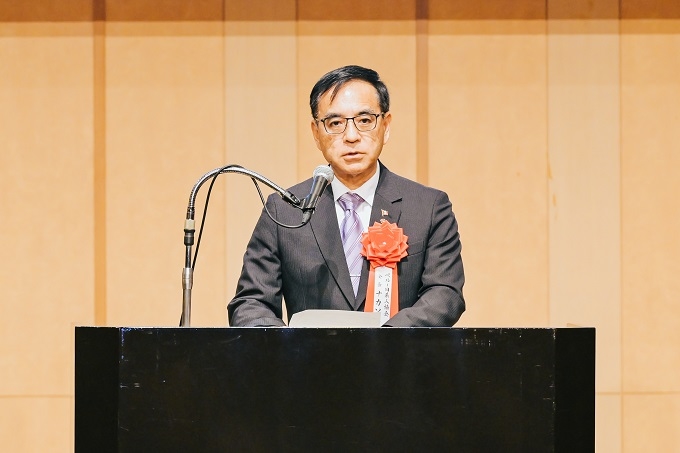 Mr. Juan Carlos Nakasone Oshiro discussing the importance of the Japan Foundation Award
Mr. Juan Carlos Nakasone Oshiro discussing the importance of the Japan Foundation Award
After the Award Ceremony, the Japan Foundation Awards 50th Anniversary Reception was held, in the presence of Their Imperial Highnesses Crown Prince and Crown Princess Akishino, who held relaxed conversation with the Award recipients.
Thereafter, the Award recipients were surrounded by many attendees who congratulated them on their past achievements and enjoyed lively conversation.
Text: Nishino Yumiko, Public Relations Dept., The Japan Foundation
Related Articles
Related Events
Keywords
Back Issues
- 2024.5.24 The 50th Japan Found…
- 2024.3. 4 Movie Theaters aroun…
- 2023.4.10 The 49th Japan Found…
- 2023.3.28 JF's Initiatives for…
- 2023.1.27 Living Together with…
- 2022.11.16 Inner Diversity <…
- 2022.6.21 The 48th Japan Found…
- 2022.3.22 JF's Initiatives for…
- 2022.3.14 JF's Initiatives for…
- 2022.2.14 JF's Initiatives for…


